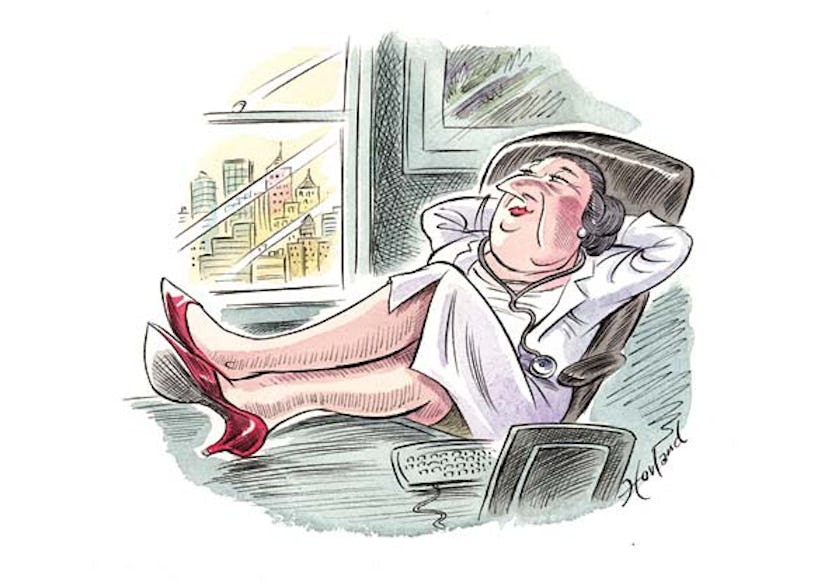The Countess’s Bitter Pill

We all know that getting a doctor’s appointment in America can be as hard as having an audience with the Pope. We also all know that to get New York doctors to make a house call is simple: They’ll come when you’re dead.
All the medical talk I’m about to inflict upon you was inspired by a lunch at one of New York’s finest restaurants, where in hobbled a former top D.C. hostess (the one with the bouffant whose husband is 91).
This lovely lady, an expert on all things medical, said that over the Thanksgiving holiday she had gotten out of bed and fallen to the floor. Her leg had collapsed, and her back was crumbling. But she couldn’t get a doctor to help.
Finally, she reached a famed neurologist, who arranged for a young surgeon at a New York hospital to see her. “You have to have an operation,” he told her. But he forbid her to stay at the hospital afterward. “You’re going straight home.”
Why? Hospitals have a bug problem: norovirus, also descriptively called the vomiting virus.
As I told this story to friends, everyone wanted to tell me their own horror tales. There was the banker who returned from Beijing with a rare form of pneumonia. He called his doctor, who took three days to call back. When he asked why it took so long, the doctor replied, “You didn’t stress how urgent it was.” The man had to spend seven weeks in the hospital, and the virus wasn’t identified until doctors sent a biopsy to the Centers for Disease Control and Prevention in Atlanta.
I visited a top doctor in New York and immediately he proposed a stress test, even though I didn’t feel stressed. The technician was wearing a very short skirt and spike heels and had a German accent. I thought I was in some kind of sex film. I left without the test, wondering if it was just another way for them to make money.
Then you read about the private clinics owned by doctors across America and how, over the holidays, they were so understaffed that patients had to call 911 to get care. Pathetic.
Nor are regular hospitals any better. A recent study said staff members take too long to respond to sudden cardiac arrest in 30 percent of the cases.
One has to wonder what medicine in this country is coming to when a headline in The New York Sun reads doctors fear malpractice ‘disaster’: physicians ‘up in arms’ over fee. That same day the International Herald Tribune ran a story about hospitals using nuclear technology with photon beams for radiation therapy. The machine requires a 222-ton accelerator and a building the size of a soccer field, with walls 18 feet thick. It can cost $100 million.
Are all these pricey technologies needed? And the pills prescribed, do you know what they are? Where they’re from? Better find out.
Things are out of whack here, and maybe Hillary Clinton is right about America needing a new health plan—even if no one wants all of hers.
Even doctors’ doctors have problems. A physician needed a valve replacement and was going to have it done back home in the Midwest but was warned, “Don’t use that doctor. He just repaired several, and they all died.” He did anyway.
At a recent dinner, I asked an Italian count where the best hospitals were in Europe. “Well,” he said, “in Rome there are rats in the hospitals, and in England they are filthy and you can’t get an appointment even in an emergency. France, in my opinion, has the best medicine today.”
I don’t know, but what I would like is a doctor who talks to you like a person rather than shuttling you through like a number at the butcher’s. As another European friend told me, “In America they treat the disease. In Europe they treat the disease and the patient.”
A book last year called How Doctors Think described how doctors in America go for the easiest answer and often stereotype patients—even as they are half thinking about their marital problems, vacations or what they’re going to have for dinner. After all, doctors are human too. One of the book’s points is that you better know exactly what is wrong with you when you go to a doctor because chances are if it’s something out of the ordinary, he won’t catch it.
Scary. So perhaps, in future, instead of “Have a nice day,” we should say, “Have a healthy and safe day.”